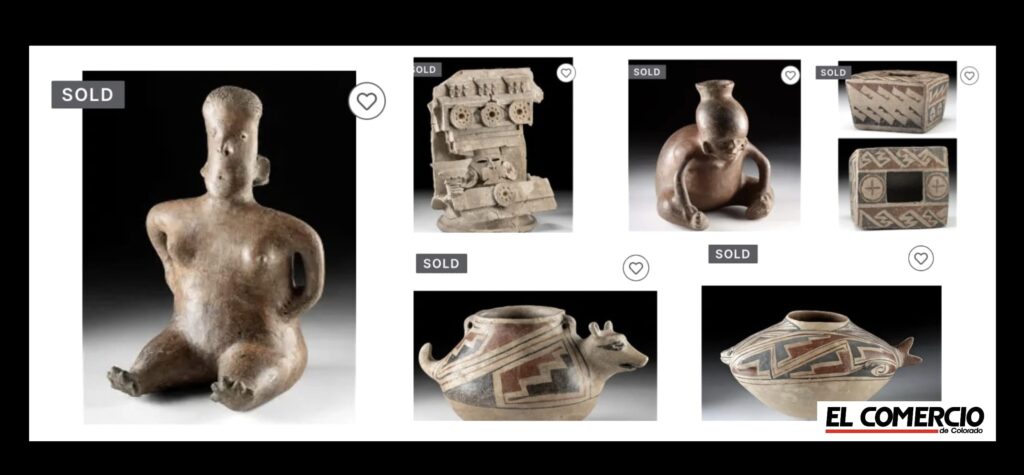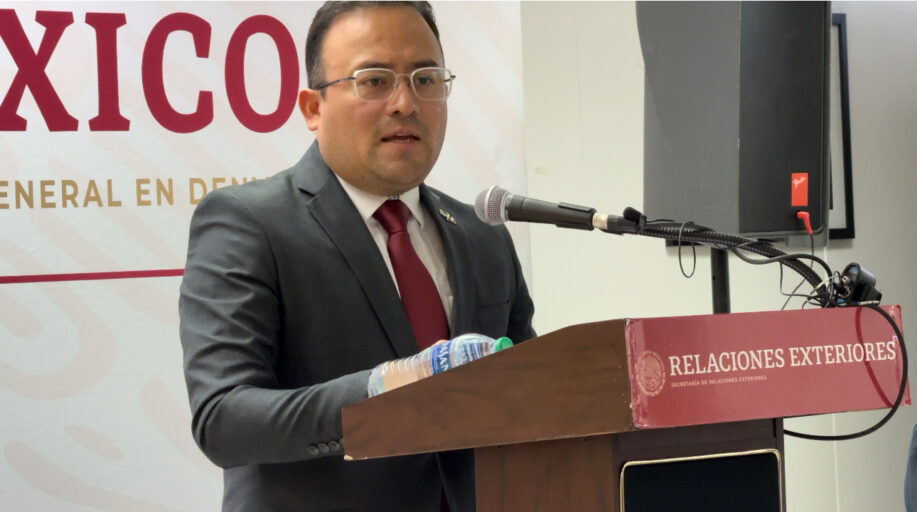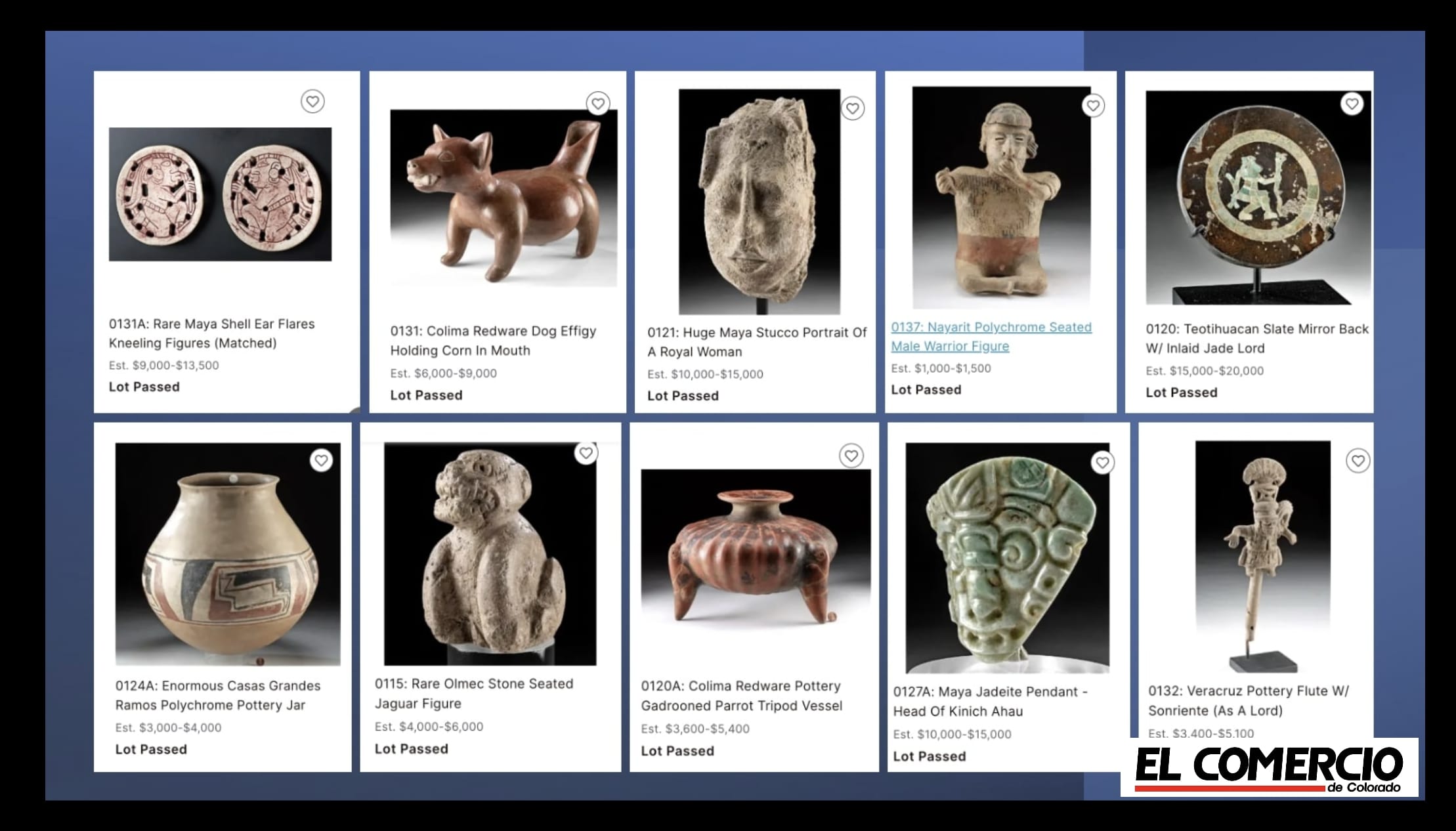
SOLD| Pieces that were auctioned by Artemis Gallery in Colorado. (Graphic/El Comercio de Colorado)
CONSUL MELÉNDEZ CRUZ SPEAKS ABOUT THE AUCTION OF SIX PIECES OF MEXICAN HERITAGE
Newsroom El Comercio de Colorado
Haga click aquí para leer la versión en español
About six pieces with heritage value for Mexico were auctioned by the Artemis Gallery based in Louisville, northwest Colorado. The total amount of the commercial transaction for the purchase of the six artistic archaeological pieces reached six thousand two hundred fifty dollars.
For twelve other pre-Hispanic art pieces from Mexico, the Artemis Gallery received no bids. The pieces that received no bids had an estimated value much higher than that of the auctioned pieces. Maritza Amaya, a pre-Hispanic art professor and expert in this business, indicates that the buyers in this auction were looking for “affordable” pieces.
Amaya also suggests that collectors possibly took into account other factors and avoided submitting bids. “A collector with the capacity to offer $20,000 for the Teotihuacan mirror with jade inlays is aware of the initiatives of the Mexican government to recover pieces attributed with heritage value,” she asserts.
Mexico activates process to repatriate archaeological pieces auctioned

IMPLEMENTING THE PROTOCOL| Pavel Meléndez Cruz, Consul General of Mexico in Denver, reports that they have activated the procedures of the 1970 UNESCO Agreement. (Graphic/El Comercio de Colorado)
Who determined the heritage value?
Specialists from the National Institute of Archaeology and History (INAH) determined that these eighteen objects put up for sale by the Colorado gallery are indeed Mexican archaeological monuments. These pieces are thus protected by the Federal Law on Monuments and Archaeological, Artistic, and Historical Sites of Mexico.
The report by these experts examined the characteristics of form, style, raw material, proportions, surface finishes, and conservation status of each piece. Now in private hands in the U.S. are three pieces of sculptural-style Casas Grandes pottery from northern Mexico from the post-classical period (1200-1400 A.D.). Two of them are from the Chihuahua area.
Two of the pieces sold in Colorado also belong to the post-classical period (300-354 A.D.). One of these pieces is from the Nayarit region and the other from Colima. Finally, the remaining piece is a fragment of a larger “theatrical” style sculpture from Teotihuacan. It is assumed to have been part of a ceremonial area from the post-classical period (300-700 A.D.).

UNSOLD | About 12 Mexican archaeological pieces remain in the hands of Artemis Gallery. (Graphic/El Comercio de Colorado)
Can Mexico repatriate these pieces?
The fact that the archaeological pieces were auctioned by the Artemis Gallery does not prevent a possible repatriation of the pieces. The 1970 UNESCO Convention regulates how this process is carried out. The new owners would be contacted by the Department of Homeland Security (DHS) and would have the right to compensation if legally viable.
However, the action of the DHS, on behalf of the American government, is related to a request and justification presented by the government of Mexico regarding the heritage value of the pieces. The Mexican INAH report on the significance of the auctioned pieces, and the ones not auctioned, must be presented by the government of Mexico to the DHS.
Taking action
Pável Meléndez Cruz, Consul General of Mexico in Denver, indicated that the Mexican government has already initiated the process derived from the 1970 UNESCO Agreement so that the eighteen pieces can be repatriated. “The Mexican government has already activated the protocol and has notified the Department of Homeland Security,” said Meléndez Cruz.
The consul revealed that in the afternoon of March 27, they delivered correspondence into the hands of a representative of the Artemis Gallery. “It is illegitimate and also immoral for the heritage of a nation, in this case Mexico, to be put up for sale. That goes against our history and against the dignity of our indigenous peoples,” added Meléndez Cruz.
Gallery response
In conversation with El Comercio de Colorado, Lissa Pipper, business manager of Artemis Gallery, pointed out that they are willing to follow all protocols and practices established in the 1970 UNESCO Agreement, which regulates the market for ancient art in the United States. For now, 12 of the archaeological pieces remain in the gallery’s hands.
You may also like:
The Denver Broncos sponsored the U-16 Flag Touch Football tournament in Mexico
Seeking Protection for Mobile Homeowners in Colorado
New Generation of Leaders Takes on Challenges






otras noticias
Hello Catira! Venezuelan flavor with soul
Colorado Rush invites kids to play, grow, and dream
Innovative plan at Adams 14 school gets green light